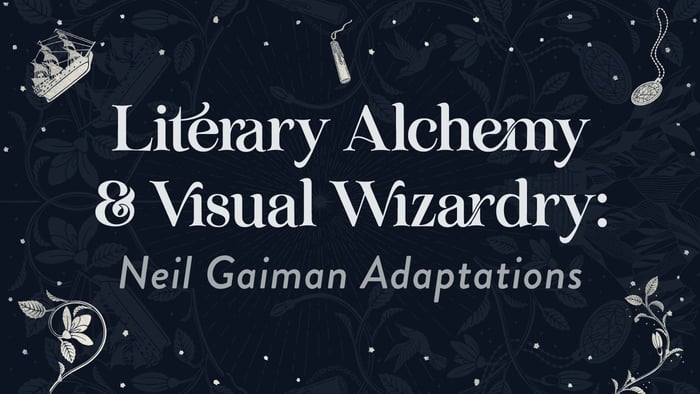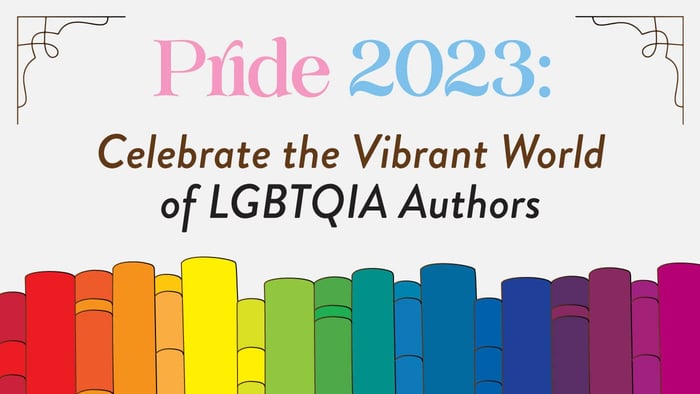
Literary Alchemy & Visual Wizardry: Neil Gaiman Adaptations
Since first capturing our imaginations with works like Sandman and Neverwhere, Neil Gaiman has cultivated a reputation as a master of the modern fantasy genre. His unique blend of twisted narratives, imaginative worlds, and captivating characters has led to numerous adaptations across various media. From the recent domination of The Sandman series on Netflix to the critically acclaimed films and television shows based on his works, Gaiman's stories have successfully transitioned from page to screen, enchanting audiences with their literary alchemy and visual wizardry.
The Sandman (2022): A Twisted Dreamworld on Screen
 | Netflix's hightly anticipated adaptation of Neil Gaiman's The Sandman is a visually stunning rendition of the beloved dark fantasy horror comic franchise that spanned 75 issues in 7 years (1989-1996). The first season covers the storylines from the initial two Sandman books: "Preludes & Nocturnes" and "The Doll's House." Starring Tom Sturridge as the enigmatic Sandman and Gwendoline Christie as the intriguing Lucifer, the series closely follows the books, bringing iconic frames and lines of dialogue to life. |
While the Netflix adaptation remains faithful to the source material, it does make some changes, including gender-flipped characters and a focus on diverse representation with Black women in central roles and nonbinary performer Mason Alexander Park as Dream's sibling Desire.
The series also embraces the spectrum of sexuality and normalizes queer relationships, adding an important layer of inclusivity and representation. The adaptation has been hailed as one of the best-screen adaptations of big concept fantasy literature, showcasing the depth and intricacy of Gaiman's storytelling.
Coraline (2009): A Haunting Journey into the Other World
 | Neil Gaiman's Coraline is a haunting and enchanting story that takes readers on a dark and whimsical journey into the depths of the Other World. Gaiman's original story, published in 2002, received widespread acclaim for its imaginative storytelling and compelling characters. It was praised for its ability to balance darkness and light, creating a tale that both children and adults could appreciate. |
In 2009, Coraline received a stunning stop-motion animated film adaptation directed by Henry Selick. The animation beautifully captures the eerie atmosphere and intricate characters, enhancing the sense of wonder and danger that permeates the narrative. The voice performances, particularly by Dakota Fanning as Coraline and Teri Hatcher as Other Mother, breathe life into the characters. The film received critical acclaim for its stunning visuals, imaginative design, and faithful adaptation of Gaiman's story.
Good Omens (2019): A Hilarious and Apocalyptic Delight
 | Neil Gaiman's Good Omens, co-written with Terry Pratchett and published in 1990, is a hilarious and irreverent tale that combines elements of fantasy, satire, and the impending apocalypse. The story revolves around an angel named Aziraphale and a demon named Crowley, who have formed an unlikely friendship over the centuries while residing on Earth. As the end of the world approaches, the duo teams up to prevent the coming of the Antichrist and the ultimate battle between Heaven and Hell. Critics and audiences wholeheartedly embrace the quirky and witty nature of Good Omens. The novel received critical acclaim for its clever wordplay, memorable characters, and its ability to tackle weighty themes with a light touch. |
In 2019, Good Omens received a television adaptation produced by Amazon Prime Video and the BBC. Starring Michael Sheen as Aziraphale and David Tennant as Crowley, the series brought Gaiman and Pratchett's vision to life. The adaptation captures the essence of the book and delivers a faithful and visually captivating rendition.
Sheen and Tennant deliver standout portrayals of Aziraphale and Crowley, capturing the nuances of their complex relationship with humor and depth. The visual effects and set designs bring the fantastical elements to life, from flaming Bentley cars to heavenly bureaucracy.
The story's blend of humor, philosophical musings, and its examination of the nature of good and evil resonates with audiences. Gaiman and Pratchett's collaboration created a narrative that is both entertaining and thought-provoking, allowing readers and viewers to reflect on the nature of humanity and our place in the universe.
Stardust (2007): A Whimsical Tale of Love, Adventure, and Magical Discoveries
 | Neil Gaiman's Stardust published in 1997, weaves a whimsical and enchanting tale that takes readers on a journey through a realm where love, adventure, and magic collide. The story follows the young and naive Tristran Thorn as he ventures into the mystical land of Faerie to find a fallen star and win the heart of his beloved. However, Tristran soon realizes that the star, named Yvaine, is not what he expected, and they become entangled in a perilous quest filled with witches, pirates, and fantastical creatures. Both the book and the film adaptation feature strong and dynamic female characters, such as Yvaine and the villainous Lamia who was an unnamed member of the Lillim in the book. Gaiman's storytelling is praised for breaking traditional gender stereotypes, with Yvaine portrayed as a star with a temper, defying the expectations of a damsel in distress or a typical strong female character trope. |
In 2007, Stardust was adapted into a film directed by Matthew Vaughn, starring Charlie Cox as Tristran Thorn (renamed "Tristan" in the adaptation), Claire Danes as the radiant Yvaine, and Michelle Pfeiffer as Lamia. The film adaptation adds a visual spectacle to Gaiman's already magical story, incorporating humor and a fun battle scene. While the movie does simplify certain aspects of the narrative, it does so to appeal to a wider audience, making it more accessible to those unfamiliar with the book.
One of the film's notable additions is the character of Captain Shakespeare, portrayed by Robert De Niro. Although initially controversial for elements of cross-dressing, the portrayal of Captain Shakespeare has evolved into a positive representation that challenges stereotypes. The character is depicted as smart, refined, and multi-dimensional, emphasizing acceptance, individual expression, and a breaking from societal expectations.
Lucifer (2016): The Devilish Charmer in Neil Gaiman's Universe
 | In Gaiman's original comic book series The Sandman, Lucifer Morningstar, the fallen angel and former ruler of Hell, abdicates his throne and opens a luxurious nightclub in Los Angeles called Lux. Seeking a life of independence and defiance against his predetermined role, Lucifer becomes entangled in various supernatural adventures while navigating the mortal world. The character's complexity stems from his mixture of charm, wit, and a profound sense of existential disillusionment. Gaiman's portrayal of Lucifer presents him as a being wrestling with his identity, questioning the notions of good and evil and challenging the preconceived notions surrounding the Devil himself. |
The television adaptation of Lucifer, which aired on Fox in 2016 and later moved to Netflix is inspired by Gaiman's character but not a direct adaptation of The Sandman. Actor Tom Ellis as Lucifer has been widely praised for his charismatic portrayal capturing the essence of the character's charm and complexity.
In the original comics, Lucifer's story serves as a captivating subplot. The TV series, however, expands on his narrative, turning him into the protagonist and delving into his interactions with mortals, his relationships, and his ongoing quest for personal fulfillment.
The TV adaptation also introduces original storylines and characters that deviate from Gaiman's original vision. Despite these differences, the TV series manages to capture the essence of Lucifer's charm and moral ambiguity, remaining faithful to his characterization as a conflicted anti-hero. It explores themes of redemption, free will, and the complexities of human nature, mirroring Gaiman's exploration of these concepts in the comics.
American Gods (2017): An Epic Clash of Old and New
 | Another notable adaptation is American Gods, based on Gaiman's novel of the same name published in 2001. This TV show which began in 2017 garnered attention for its mesmerizing visuals and captivating performances with Ian McShane as Mr. Wednesday and Ricky Whittle playing Shadow Moon. The story follows Shadow Moon, a recently released convict who becomes entangled in a battle between the Old Gods and the New Gods. As the narrative unfolds, viewers are immersed in a world where deities clash, and ancient mythology intersects with the modern age. |
American Godsshowcases Gaiman's signature blend of mythology, fantasy, and contemporary themes. The TV adaptation successfully captures the essence of the book, thanks to its visual flair and strong acting performances. While the series introduces some deviations from the source material, it manages to maintain the core elements of Gaiman's narrative, exploring the clash between old traditions and new belief systems in a visually stunning and thought-provoking manner.
Unfortunately, after some mishaps and leadership changes in seasons two and three, the series was cancelled.
Likely Stories (2016): Neil Gaiman's Enigmatic Tales Come to Life
 | While The Sandman, American Gods, and Good Omenshave gained significant recognition, it is important not to overlook the lesser-known adaptations of Gaiman's works. Likely Stories , an exclusive TV series available on Shudder, is a prime example. Comprising four standalone episodes, each exploring unique and eerie stories from Gaiman's original, Likely Storiesoffers viewers a glimpse into the darker corners of Gaiman's imagination. Despite its relative obscurity,Likely Storiesproves to be a faithful adaptation that captures the essence of Gaiman's storytelling. Each episode presents a distinct narrative, delving into the macabre and the supernatural. For fans of Black Mirror, this series is for you! |
How To Talk To Girls At Parties (2017): A Punkish Extraterrestrial Adventure
 | Adapting Gaiman's short story, "How To Talk To Girls At Parties," this film takes viewers on a punk-infused journey. The story follows Enn, a London punk who attends a party and encounters a girl who seems otherworldly. While the adaptation includes additional contributions from the screenwriters and director, it remains faithful to Gaiman's storytelling style. The film captures the essence of youthful rebellion and the allure of the unknown, creating a unique cinematic experience. |
MirrorMask (2005): A Visual Feast and Surreal Journey
 | Rounding off our exploration of Gaiman's adaptations, we encounter MirrorMask , a visually stunning film co-created by Gaiman and director Dave McKean. This mesmerizing tale follows a teenage girl who enters a fantastical world and must find a magical charm called MirrorMask to save the kingdom. The film's imaginative visuals, infused with Gaiman's signature storytelling, create a truly immersive experience, blurring the line between reality and fantasy. |
Will there be more?
Neil Gaiman's stories possess an unparalleled imagination and intricacy that captivate and enthrall readers and viewers alike. From the twisted dreamworld of The Sandman to the haunting journey of Coraline , his works transport us to realms where darkness and whimsy coexist. These adaptations, whether on screen or in other forms of media, bring Gaiman's literary alchemy to life, enchanting audiences with cinematic wizardry. Gaiman's narratives challenge conventions, explore profound themes, and leave an indelible mark on our minds, igniting our imaginations and urging us to embrace the unknown. The stories and adaptations are portals to hidden realms, reminders of the magic within us, and a testament to the enduring allure of the fantastical.


